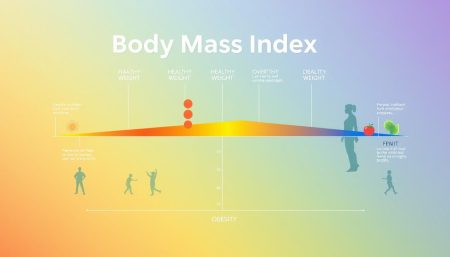Starting a journey to understand body mass index (BMI) shows its importance as a key health marker. It comes from the World Health Organization. BMI is a simple way to check if your weight matches your height. It helps tell if you are underweight, normal, overweight, or obese.
The bmi chart is a guide for people wanting to know their weight status. The Centers for Disease Control and Prevention (CDC) supports using these tools. They help people check their weight category and encourage healthy living.
Looking closer, studies in the American Journal of Clinical Nutrition see BMI as more than a number. It shows how likely you are to face health problems. This shows how important BMI is as a bmi health indicator.
Key Takeaways
- Body Mass Index (BMI) is an index of weight-for-height, used to classify weight categories in adults.
- The World Health Organization provides a foundational understanding of BMI.
- BMI charts are tools endorsed by the CDC to help individuals identify their healthy weight range.
- Research indicates BMI’s potency as a health indicator, correlating with potential risks for various conditions.
- Exercising informed vigilance through BMI self-assessment is a step toward health empowerment.
Understanding Body Mass Index (BMI)
Body Mass Index (BMI) is a key measure of health. It shows how a person’s weight and height match up. This section explores what BMI is, its history, and why it’s important for health.
Definition of BMI
What is body mass index? BMI is a way to measure body size. It’s found by dividing weight in kilograms by height in meters squared (kg/m²). It helps sort people into weight groups, showing health risks.
Historical Background
The idea of BMI started with Adolphe Quetelet in the 19th century. He created the Quetelet Index of obesity. Later, it became known as Body Mass Index. It’s used worldwide to check body weight.
Importance of BMI
BMI is key in health, insurance, and wellness. It helps spot weight issues early. This makes it useful in studies and health plans.
Using BMI in health checks shows its value. But, knowing its limits is also important.
BMI helps people manage their health. It guides decisions on body weight and well-being. This knowledge supports a healthy lifestyle and personal health goals.
How to Calculate BMI
Knowing how to calculate your Body Mass Index (BMI) is key to understanding your health. This guide will show you the bmi formula, how to use an bmi calculator online, and the right units to use.
The BMI Formula
The bmi formula is simple: BMI = weight (kg) / height² (m²). It helps estimate body fat based on weight and height. If you prefer imperial units, the formula changes to BMI = [weight (lbs) / height² (in²)] * 703.
Using Online BMI Calculators
An bmi calculator online is a handy tool. Places like the National Institutes of Health offer these calculators. Just enter your height and weight, and it calculates your BMI for you.
Understanding the Units
Using the right units is important for accurate BMI calculations. The standard uses kilograms for weight and meters for height. If you use pounds and inches, remember to use the 703 conversion factor in the formula.
| Unit Type | Weight Unit | Height Unit | Formula |
|---|---|---|---|
| Metric | Kilograms (kg) | Meters (m) | BMI = kg / m² |
| Imperial | Pounds (lbs) | Inches (in) | BMI = (lbs / in²) * 703 |
Interpreting Your BMI Results
Understanding your BMI results is key to knowing your health status. The bmi chart assigns numbers to weight statuses. It helps you see if you’re underweight, normal, overweight, or obese. But, these categories have their own bmi interpretation limitations.
BMI Categories Explained
Each BMI category has health implications. A healthy bmi range of 18.5 to 24.9 means lower risks for heart disease and diabetes. Here are the categories:
- Underweight: BMI less than 18.5
- Normal weight: BMI 18.5–24.9
- Overweight: BMI 25–29.9
- Obesity: BMI 30 or greater
What an Ideal BMI Looks Like
The healthy BMI range is widely accepted. Yet, what’s ideal varies among individuals. Muscle mass, age, sex, and bone density are important factors. For example, athletes might have a higher BMI due to muscle, but they’re not at higher health risks.
Limitations of BMI Interpretation
The BMI doesn’t distinguish between muscle and fat weight. This can lead to misclassifications. It also doesn’t consider fat distribution, which affects health risks. Studies in The BMJ show BMI might not accurately assess health risks.
| BMI Category | Typical Health Risk |
|---|---|
| Underweight | Potential nutritional deficiency and bone density loss |
| Normal Weight | Lower risk of heart disease and diabetes |
| Overweight | Moderately increased risk of heart disease |
| Obesity | High risk for numerous health conditions |
Considering the complexities, it’s crucial to go beyond BMI. Look at comprehensive physical assessments for a full picture of your health.
BMI and Health Risks
An elevated Body Mass Index (BMI) often signals potential health issues. It shows how BMI is linked to chronic diseases and obesity. Knowing about body fat percentage helps people make better lifestyle choices.
Relationship Between BMI and Chronic Diseases
Higher BMI values are linked to chronic diseases like type 2 diabetes and heart disease. The Harvard T.H. Chan School of Public Health has studied this link. They found that managing BMI can lower these risks and improve overall health.
By making lifestyle changes, you can reduce these risks and feel better.
BMI’s Role in Assessing Obesity
Accurate obesity assessment is key in health care. The American Heart Association sees BMI as a major indicator for heart disease risk. It helps doctors spot at-risk individuals and guide them to better health.
Understanding Body Fat Percentage
While BMI is useful, it doesn’t measure body fat directly. Body fat percentage gives deeper insights into health risks. Studies in The Lancet show its value in assessing obesity and guiding health plans.
BMI and body fat percentage together offer a full view of weight-related health risks. They help guide people towards better health choices. Understanding their importance is vital for public health efforts against obesity.
Factors Influencing BMI
It’s important to know what affects Body Mass Index (BMI). Key bmi influencing factors include age, gender, ethnicity, and muscle mass vs body fat. These factors can change how BMI is seen as a health measure.
Age and Gender Considerations
As we get older, our bodies change. We tend to gain fat and lose muscle. This means older adults need a different view of what’s a ‘normal’ BMI. Men and women also store fat differently, which affects BMI readings.
Ethnic Groups and BMI Variations
Studies show BMI can differ among ethnic groups. This is due to body composition, lifestyle, and genetics. Using ethnic-specific BMI cutoffs can better assess health risks tied to weight.
Muscle Mass vs. Body Fat
The usual BMI calculation doesn’t separate muscle mass vs body fat. This can lead to wrong classifications. For example, athletes with lots of muscle might have a high BMI but low body fat. This puts them in the wrong health risk category.
| Factor | Impact on BMI | Considerations |
|---|---|---|
| Age | Older adults typically have higher BMI due to increased fat mass | Adjust BMI ranges for older age groups to reflect changes in body composition |
| Gender | Different fat distribution patterns in men and women | Consider gender-specific BMI ranges to improve accuracy |
| Ethnicity | Varying body types and composition across ethnic groups | Implement ethnic-specific BMI cutoffs to assess health risks better |
| Muscle Mass | Athletes may have high BMI due to muscle, not fat | Use additional body composition measurements for accurate health assessment |
BMI for Different Populations
The Body Mass Index (BMI) is used worldwide but needs changes for certain groups. This includes children, older adults, and athletes. These changes help because BMI doesn’t always show the right picture for everyone.
BMI in Children and Adolescents
For kids, it’s all about growth and development. The CDC uses BMI-for-age percentiles, taking into account age and sex. This method helps spot healthy weights in kids and teens, guiding them to avoid obesity or being too thin.
Adjustments for Older Adults
Older adults face unique challenges like losing muscle and becoming frail. Gerontology experts say we need to rethink BMI for them. A lower BMI might not mean they’re healthier because of these changes.
Special Considerations for Athletes
Athletes need their own approach because of their intense training. This training builds muscle, which can skew BMI readings. It’s better to use body composition tests to get a true picture of their health.

Healthcare professionals must use special tools for each group. This includes growth charts, adjusted BMI scales, and body composition tests. These tools help give more accurate health advice, leading to better care.
Understanding the importance of early screenings is key to keeping everyone healthy. This includes managing BMI. Learn more about early detection methods in breast cancer for a deeper look into preventive care.
| Population | Consideration | Recommended Method |
|---|---|---|
| Children & Adolescents | Use BMI-for-age percentiles | CDC growth charts |
| Older Adults | Adjust BMI ranges for muscle mass decline | Revised BMI scales |
| Athletes | Account for increased muscle mass | Body composition analysis |
Benefits of Maintaining a Healthy BMI
Keeping a healthy Body Mass Index (BMI) is key to reducing health risks and improving your life. Studies show it helps you live longer, stay physically fit, and feel mentally well.
Reducing Health Risks
A study in The New England Journal of Medicine found that a healthy BMI lowers the risk of diseases. This includes diabetes, heart issues, and some cancers. It shows how important it is to manage your BMI for better health.
Enhancing Quality of Life
A study in Quality of Life Research found that people with a normal BMI feel better physically and mentally. This leads to a happier, more productive life, making your days better and your future brighter.
Improving Physical Performance
For athletes, a healthy BMI boosts endurance and strength. It also cuts down injury risks and improves performance, as shown in the Journal of Sports Sciences. This shows how a healthy BMI can enhance your activities and lifestyle.
| Health Aspect | Impact of Healthy BMI |
|---|---|
| Chronic Disease Risk | Significantly Lowered |
| Physical Health | Improved Strength and Vitality |
| Mental Well-being | Enhanced Emotional and Psychological Health |
| Athletic Performance | Increased Endurance and Reduced Injuries |
Common Misconceptions About BMI
In the world of health and wellness, BMI misconceptions are common. They often change how we see what it means to be healthy. BMI, or Body Mass Index, is used to measure body composition. But it’s not a full picture of health.
This section will look at the myths around BMI. It will also introduce bmi alternatives that better show overall health.
Myths vs. Facts
Many think BMI measures body fat. But BMI only looks at height and weight, ignoring muscle and bone. Another myth is that a normal BMI means you’re healthy. But it doesn’t consider other important health signs.
Why BMI Isn’t the Only Measure of Health
Looking at comprehensive health measures means more than just BMI. Blood pressure, cholesterol, and blood sugar are also key. Relying only on BMI can hide health risks, like too much body fat in people with normal BMI.
Alternatives to BMI Assessments
To fix BMI’s limits, several bmi alternatives offer a better health view. These metrics look at different body parts and their health risks.
| Measurement | Focus | Benefits |
|---|---|---|
| Waist-to-Hip Ratio | Proportion of waist to hips | Shows body fat distribution, linked to metabolic health |
| Waist Circumference | Abdominal fat | Helps check obesity-related risks |
| Bioelectrical Impedance Analysis | Body composition | Measures body fat against lean body mass |
Using these alternatives in health checks can give a more accurate picture. They help fix the problems with traditional BMI.
Practical Tips for Managing BMI
Managing BMI is more than just knowing your numbers. It’s about taking practical steps towards a healthier life. Eating well, staying active, and setting achievable goals are key.
Healthy Eating Habits
Eating right is essential for managing BMI. Focus on fruits, veggies, whole grains, and lean proteins. These foods help keep your calorie intake balanced and provide vital nutrients.
The “Dietary Guidelines for Americans” offer great advice. They help you make choices that support a healthy BMI.
Incorporating Physical Activity
Exercise is vital for managing BMI. It burns calories and builds muscle, which helps your health. Try walking, cycling, or strength training to stay active.
Setting Realistic Goals
Setting realistic goals is crucial for managing BMI. Work with healthcare professionals to set goals you can reach. Aim for slow, steady progress, not perfection.
| Goal Type | Examples | Benefits |
|---|---|---|
| Dietary Adjustments | Adding two servings of vegetables daily | Enhances nutrient intake, aids in weight management |
| Physical Activity | 30 minutes of walking five days a week | Boosts metabolic rate, improves cardiovascular health |
| Weight Management | Losing 1 pound per week | Promotes sustainable weight loss, reduces BMI over time |
The Role of Healthcare Professionals
In the complex world of healthcare, professionals play a key role. They help us keep our bodies healthy and understand important metrics like BMI. Regular checkups and monitoring of BMI are key to preventive care, guiding us towards better health.
Importance of Regular Health Check-ups
Healthcare experts stress the need for regular checkups. These visits are vital for checking health metrics and discussing ways to stay healthy. They also build trust, which is crucial for good care and motivation.
How Doctors Use BMI in Assessments
Doctors often use BMI because it’s easy to measure. It helps them quickly see if a person’s weight is healthy. The Journal of General Internal Medicine says doctors talk about weight and health risks based on BMI. This can lead to more detailed tests if needed.
Collaborating with Nutritionists
Nutritionists are key in creating diet plans that work. They make plans based on a person’s health, lifestyle, BMI, and goals. This teamwork makes sure diet plans are effective and easy to follow.
Healthcare professionals take a full approach to managing BMI. They assess, counsel, and tailor interventions. This support system is essential for raising awareness and empowering people to manage their health.
Conclusion: Embracing a Healthy Lifestyle
Understanding the importance of monitoring BMI is key to good health. This article has explored Body Mass Index and its role in health. It helps us make smart choices about our well-being.
While BMI isn’t perfect, it’s a big step towards a healthy lifestyle.
Summarizing the Importance of BMI
A study in “The Lancet Public Health” shows BMI’s value. It’s not just a number but a starting point for health talks. It helps set goals for a healthier life.
Tracking BMI regularly can help avoid health problems later.
Encouragement to Monitor Your Health
Staying alert to your health is crucial. The World Health Organization (WHO) offers health education resources. These resources show our shared goal to empower you with knowledge.
Use these tools, get professional advice, and listen to your body. Being well-informed is key to a healthy life.
Resources for Further Reading
For more info, the WHO has guides on many health topics. These resources can deepen your understanding and improve self-care. Commit to learning and make it the base of your journey to a healthy life.
Let’s move forward with education, empowerment, and health together.
FAQ
Q: What is Body Mass Index (BMI)?
A: BMI, or Body Mass Index, is a number that shows how much body fat you have. It’s based on your weight and height. The World Health Organization uses it to tell if you’re underweight, normal weight, overweight, or obese.
Q: How is BMI calculated?
A: To find your BMI, you use the formula BMI = weight (kg) / height² (m²). If you’re using pounds and inches, it’s BMI = [weight (lbs) / height² (in²)] * 703. This formula helps estimate your body fat based on your height and weight.
Q: What do the different BMI categories mean?
A: BMI categories show different weight ranges. They are: underweight (less than 18.5), normal weight (18.5–24.9), overweight (25–29.9), and obesity (30 or greater). These ranges can help spot potential health risks.
Q: Are there any risks associated with a high BMI?
A: Yes, a high BMI can increase the risk of diseases like type 2 diabetes, high blood pressure, heart disease, and some cancers. Studies by Harvard T.H. Chan School of Public Health have shown this link.
Q: Can muscle mass affect BMI?
A: Yes, muscle mass can affect your BMI. Muscle is denser than fat. So, athletes or people with a lot of muscle might have a high BMI but not be overweight. This can lead to a wrong BMI classification.
Q: How can healthcare professionals help with BMI management?
A: Doctors and nutritionists are key in managing BMI. They do health check-ups, use BMI in assessments, and create diet and exercise plans. These plans help improve your BMI.
Q: What are some practical tips for managing BMI?
A: To manage BMI, eat healthy foods like fruits, veggies, whole grains, and lean proteins. Also, do regular exercise to build muscle and burn calories. Setting health and weight goals with a doctor’s help is also important.
Q: Are there any alternatives to BMI for assessing health and body fat?
A: Yes, there are other ways to measure health and body fat. These include waist-to-hip ratio, waist circumference, and bioelectrical impedance analysis. They can give more information than BMI, especially when BMI doesn’t show the whole picture.
Q: Is BMI applicable to all age groups?
A: BMI is adjusted for kids and teens because they grow and develop differently. For older adults, BMI might need to be adjusted too because of changes in muscle and body composition with age.
Q: Why is it important to maintain a healthy BMI?
A: A healthy BMI is linked to lower disease risks, longer life, and better metabolic health. Studies in “The New England Journal of Medicine” and others have shown these benefits. Keeping a healthy BMI is key.

















